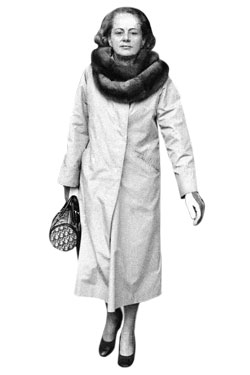
1980
I suppose the best moment was at the very beginning.
This is how it is with great murders: At the very beginning, you know only the basic outline, the tabloid headline on the first-day story; so you have the maximum ability to apply your theories, your insights, your own particular life lessons—in short, your narcissism—to what happened. Every murder is a Rorschach, and the Rorschach is at its most powerful before you know too much, before the inconvenient facts get in the way, before the people involved turn out to be people after all.
And so on March 12, 1980, when all of New York awoke to the news, this was what we knew: that Jean Harris, 57, the headmistress of the Madeira School, had driven from Virginia to Scarsdale, New York, and killed her former boyfriend, a best-selling diet doctor named Herman Tarnower, 69, by shooting him four times.
There it was: socialite held in doc slaying. It was a tabloid dream. The doctor lived in an “exclusive” Westchester home, the socialite headed a “posh” girls’ school.
We were thrilled. When I say we, I mean me, but I also mean every woman who has ever wanted to kill a bad boyfriend.
There was a kind of giddy exhilaration that passed through the city. I’m not just projecting. Everyone called everyone up. The day was completely blown discussing it. We were all thinking, You go, girl, even though that expression had not yet been invented.
It was clear there would turn out to be another woman (there was), and that she would be younger, prettier, blonde, and probably his receptionist (all true). But as it turned out, Jean Harris did not want to be a celebrity murderess like Roxie Hart, or even a poster child for women whose antidepressant supplies run low. She was a proud, prickly woman, a classic headmistress. The night of the murder, she’d worn a headband. She insisted to police that she hadn’t meant to kill Tarnower; she’d brought the gun to Scarsdale only to kill herself. She claimed that Tarnower had tried to take the gun away from her, and she’d accidentally shot him.
She could easily have gotten off by pleading temporary insanity; she could have copped to a lesser plea; instead she stuck to her sad, implausible story. She had a terrible lawyer, in our opinion. We all spent hours discussing this. We dissected her defense, rewrote her version of things so it would conform to our expectations. After she was convicted of second-degree murder and sentenced to fifteen years in prison, we wrote letters to the governor urging him to commute her sentence. Finally, after twelve years, he did.
Two TV movies were made about the murder, and several books written, including dueling best sellers by Shana Alexander and Diana Trilling, but all of them suffered from the fact that Jean Harris’s one big moment had been completely out of character.
Harris herself wrote three books, including a best-selling autobiography, and became an advocate for incarcerated women and their children. She is now 88 and lives in a retirement home.
From the Archives: ‘The Headmistress and the Diet Doctor’ (March 31, 1980)